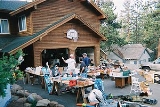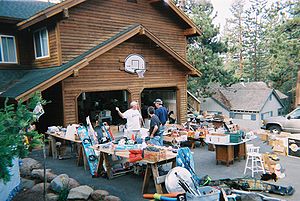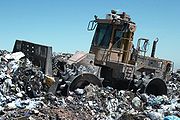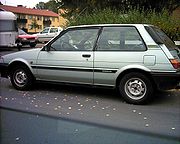
Used goods
Encyclopedia

Good (economics and accounting)
In economics, a good is something that is intended to satisfy some wants or needs of a consumer and thus has economic utility. It is normally used in the plural form—goods—to denote tangible commodities such as products and materials....
is one that is being purchased by or otherwise transferred to a second or later end user. A used good can also simply mean it is no longer in the same condition as it was when it was first transferred to the current end user. Used goods may be transferred informally between friends and family for free as "hand-me-downs" or they may be sold for a fraction of their original price at garage sales or in church bazaar
Bazaar
A bazaar , Cypriot Greek: pantopoula) is a permanent merchandising area, marketplace, or street of shops where goods and services are exchanged or sold. The term is sometimes also used to refer to the "network of merchants, bankers and craftsmen" who work that area...
fundraisers. Governments require some used goods to be sold through regulated markets, as in the case of items which have safety and legal issues, such as used firearms or cars; for these items, government licensing bodies require certification and registration of the sale, to prevent the sale of stolen, unregistered, or unsafe goods. As well, for some high-value used goods, such as cars and motorcycles, governments regulate used sales to ensure that the government gets its sales tax revenue from the sale.
Benefits
Second-hand goods can benefit the purchaser as the price paid is lower than the same items bought new. If the reduction in price more than compensates for the possibly shorter remaining lifetime, lack of warranty, and so on, there is a net benefit.Selling unwanted goods second-hand instead of discarding them obviously benefits the seller.
Recycling
Recycling
Recycling is processing used materials into new products to prevent waste of potentially useful materials, reduce the consumption of fresh raw materials, reduce energy usage, reduce air pollution and water pollution by reducing the need for "conventional" waste disposal, and lower greenhouse...
goods through the second-hand market both reduces use of resources in manufacturing new goods, and diminishes waste which must be disposed of, both significant environmental benefits. However, manufacturers who profit from sales of new goods lose corresponding sales.
Risks
Second-hand goods may have faults which are not apparent even if examined; purchasing sight unseen, for example, from an Internet auction site, has further unknowns. Goods may cause problems beyond their value; for example, furniture may have not easily seen bedbugBedbug
Cimicidae are small parasitic insects. The most common type is Cimex lectularius. The term usually refers to species that prefer to feed on human blood...
s which may cause an infestation which is difficult and expensive to eradicate. Faulty electrical and mechanical goods can be hazardous and dangerous.
Goods sold second-hand may have been stolen
Theft
In common usage, theft is the illegal taking of another person's property without that person's permission or consent. The word is also used as an informal shorthand term for some crimes against property, such as burglary, embezzlement, larceny, looting, robbery, shoplifting and fraud...
. In this case in most jurisdictions the goods do not become the legal property of the purchaser; and knowing purchase of stolen goods is a criminal offence.
Types of transfers
Many items that are considered obsolete and worthless in developed countries, such as decade-old hand tools and clothes, are useful and valuable in impoverished communities in the country or in developing countries. Underdeveloped countries like Zambia are extremely welcoming to donated second-hand clothing. At a time when the country’s economy was in severe decline the used goods provided jobs by keeping “many others busy with repairs and alterations”. It has created a type of spin-off economy at a time when many Zambians were out of work. The used garments and materials that were donated to the country also allowed for the production of “a wide range of fabrics” whose imports had been previously restricted. The trade is essentially executed by women who operate their small business based on local associations and networks. Not only does this provide self-employment, but it also increases household income and enhances the economy. But while many countries would be welcoming of second-hand goods, it is also true that there are countries in need who refuse donated items. Countries like Poland, Philippines and Pakistan have been known to reject second hand items for “fear of venereal disease and risk to personal hygiene”. Similar to these countries, India also refuses the import of second-hand clothing but will accept the import of wool fibers, including mutilated hosiery which is a term meaning "woollen garments shredded by machine in the West prior to export". Through the production of shoddy, most of which is produced in Northern India today, unused clothing can be recycled into fibres that are spun into yarn for reuse in 'new' used goods.The acceptance of second hand goods goes beyond the need of the people and into the hands of government officials. United States taxpayers can deduct donations of used goods to charitable organizations. Both Goodwill Industries and the Salvation Army web sites have lists of items with their estimated range of values. Another way that people transfer used goods is by giving them to friends or relatives. When a person gives an item of some value that they have used to someone else, such as a used car or a winter coat, it is sometimes referred to as a "hand-me-down".

Auction
An auction is a process of buying and selling goods or services by offering them up for bid, taking bids, and then selling the item to the highest bidder...
s, garage sale
Garage sale
A garage sale, also known as a yard sale, rummage sale, tag sale, lawn sale, attic sale, moving sale, or junk sale, is an informal, irregularly scheduled event for the sale of used goods by private individuals, in which "block sales" are allowed, so that sellers are not required to obtain business...
s, and in more recent times online auctions. Some stores sell both new and used goods (e.g. car dealership
Car dealership
A car dealership or vehicle local distribution is a business that sells new or used cars at the retail level, based on a dealership contract with an automaker or its sales subsidiary. It employs automobile salespeople to do the selling...
s), while others only sell new goods but may take used items in exchange for credit toward the purchase of newer goods. For example, some musical instrument stores and high-end audio stores only sell new gear, but they will accept good quality used items as trade ins towards the purchase of new items; after the store purchases the used items, they then sell them using online auctions or other services.
When an item is no longer of use to a person they may sell or pawn it, especially when they are in need of money
Money
Money is any object or record that is generally accepted as payment for goods and services and repayment of debts in a given country or socio-economic context. The main functions of money are distinguished as: a medium of exchange; a unit of account; a store of value; and, occasionally in the past,...
. Items can also be sold (or taken away free of cost) as scrap
Scrap
Scrap is a term used to describe recyclable and other materials left over from every manner of product consumption, such as parts of vehicles, building supplies, and surplus materials. Unlike waste, scrap has significant monetary value...
(e.g. a broken-down old car will be towed away for free for its scrap metal value). Owners may sell the good themselves or to a dealer who then sells it on for a profit. However, because the process takes some effort on part of the owner they may simply keep possession of it or dump it at a landfill
Landfill
A landfill site , is a site for the disposal of waste materials by burial and is the oldest form of waste treatment...
instead of going to the trouble of selling it. It has been common to buy second-hand or used good on markets or bazaars for long time. When the web became popular, it became common with web sites such as eBay
EBay
eBay Inc. is an American internet consumer-to-consumer corporation that manages eBay.com, an online auction and shopping website in which people and businesses buy and sell a broad variety of goods and services worldwide...
and Yahoo! Classifieds
Yahoo!
Yahoo! Inc. is an American multinational internet corporation headquartered in Sunnyvale, California, United States. The company is perhaps best known for its web portal, search engine , Yahoo! Directory, Yahoo! Mail, Yahoo! News, Yahoo! Groups, Yahoo! Answers, advertising, online mapping ,...
.
Purchase

Money
Money is any object or record that is generally accepted as payment for goods and services and repayment of debts in a given country or socio-economic context. The main functions of money are distinguished as: a medium of exchange; a unit of account; a store of value; and, occasionally in the past,...
, as they are typically worth less than the equivalent new items. Purchasing used items for reuse
Reuse
To reuse is to use an item more than once. This includes conventional reuse where the item is used again for the same function, and new-life reuse where it is used for a different function. In contrast, recycling is the breaking down of the used item into raw materials which are used to make new...
prevents them from becoming waste
Waste
Waste is unwanted or useless materials. In biology, waste is any of the many unwanted substances or toxins that are expelled from living organisms, metabolic waste; such as urea, sweat or feces. Litter is waste which has been disposed of improperly...
and saves costly production of equivalent new goods. Motivations for purchase include conserving natural resource
Natural resource
Natural resources occur naturally within environments that exist relatively undisturbed by mankind, in a natural form. A natural resource is often characterized by amounts of biodiversity and geodiversity existent in various ecosystems....
s and protecting the environment
Natural environment
The natural environment encompasses all living and non-living things occurring naturally on Earth or some region thereof. It is an environment that encompasses the interaction of all living species....
, and may form part of a simple living
Simple living
Simple living encompasses a number of different voluntary practices to simplify one's lifestyle. These may include reducing one's possessions or increasing self-sufficiency, for example. Simple living may be characterized by individuals being satisfied with what they need rather than want...
plan.
Despite this, many people prefer to buy most or all of their goods new [citation needed]. They may feel safer buying new because a warranty
Warranty
In business and legal transactions, a warranty is an assurance by one party to the other party that specific facts or conditions are true or will happen; the other party is permitted to rely on that assurance and seek some type of remedy if it is not true or followed.In real estate transactions, a...
is provided or because they are concerned they may be buying stolen goods. Goods purchased secondhand may also be exempt from certain legal requirements (e.g. consumer protection
Consumer protection
Consumer protection laws designed to ensure fair trade competition and the free flow of truthful information in the marketplace. The laws are designed to prevent businesses that engage in fraud or specified unfair practices from gaining an advantage over competitors and may provide additional...
laws). Other consumers may be willing to buy used, but simply do not know where to buy them or lack the expertise needed to make a good purchase (e.g. a used car). Haggling may be involved in purchase of used goods, especially in less formal situations like a yard sale or in pawnshops, where negotiation is often done. Some consumers are uncomfortable or inexperienced in this situation too, and may choose to buy new goods instead. However some simply prefer their goods brand new and/or feel secondhand items are inferior or shabby (the 'yuck factor'), especially in the case of clothing or items used for eating such as plates or cutlery. Although this view is predominant in Western and developed nations, it is not universally held. Populations of many second- and third-world nations often prefer second-hand items for their relative availability and lower cost, as much of the used clothing from the US and European nations are exported to developing nations for resale [citation needed].
Cars

Used car
Automobile
An automobile, autocar, motor car or car is a wheeled motor vehicle used for transporting passengers, which also carries its own engine or motor...
s are especially notable for depreciating in value much faster than many other items. Used cars may have been bought or lease
Lease
A lease is a contractual arrangement calling for the lessee to pay the lessor for use of an asset. A rental agreement is a lease in which the asset is tangible property...
d by their previous user, and may be purchased directly from the previous owner or through a dealer. George Akerlof
George Akerlof
George Arthur Akerlof is an American economist and Koshland Professor of Economics at the University of California, Berkeley. He won the 2001 Nobel Prize in Economics George Arthur Akerlof (born June 17, 1940) is an American economist and Koshland Professor of Economics at the University of...
published a paper entitled "The Market for Lemons
The Market for Lemons
"The Market for Lemons: Quality Uncertainty and the Market Mechanism" is a 1970 paper by the economist George Akerlof. It discusses information asymmetry, which occurs when the seller knows more about a product than the buyer. A lemon is an American slang term for a car that is found to be...
", examining the effects of information asymmetry
Information asymmetry
In economics and contract theory, information asymmetry deals with the study of decisions in transactions where one party has more or better information than the other. This creates an imbalance of power in transactions which can sometimes cause the transactions to go awry, a kind of market failure...
on the used car market. Used cars may require more maintenance or have fewer features than later equivalent models.
For used plug-in or all-electric vehicle batteries, see V2G.
Other items
The Sierra Club, an environmental organization, argues that second-hand purchasing of furniture is the "greenest" way of furnishing a home.Used clothing is often donated to charities which sort and distribute it to people on low incomes for free or a very low price. Rather than distributing the clothing directly, some organizations will sell collected clothing in bulk to a used clothing redistributor, and then use the raised funds to finance either their charitable or for-profit activities, as they see fit. Used clothing unsuitable for sale in an affluent market may still find a buyer or end-user in another market, such as a student market or a less affluent region of a developing country. In developing countries, such as Zambia, second-hand clothing is sorted, recycled and sometimes redistributed to other nations. Some of the scraps are kept and used to create unique fashions which enable the locals to construct identity. Not only does the trade represent a great source of employment for women as well as men, it also supports other facets of the economy: the merchants buy timber and other materials for their stands, metal hangers to display clothing, and food and drinks for costumers. Carriers also find work as they transport the garments from factories to various locations. The second-hand clothing trade is central to the lives of many citizens dwelling in such countries. A Dress Agent will often deal with a consumer buyer and seller directly, taking unwanted clothes that still have value, and reselling them in a shop.
Vintage guitar
Vintage guitar
A Vintage guitar is an old guitar usually sought after and maintained by avid collectors. Musicians and dealers commonly claim that older guitars have superior craftsmanship to modern mass-produced ones....
s also became increasingly desired objects among musicians and collectors during the nineties and afterwards.
See also
- Auto auction
- Charity shopCharity shopA charity shop, thrift shop, thrift store, hospice shop , resale shop or op shop is a retail establishment run by a charitable organization to raise money.Charity shops are a type of social enterprise...
(also known as thrift store, hospice shop, resale shop, op shop, or second-hand shop) - Flea marketFlea marketA flea market or swap meet is a type of bazaar where inexpensive or secondhand goods are sold or bartered. It may be indoors, such as in a warehouse or school gymnasium; or it may be outdoors, such as in a field or under a tent...
- FreeganismFreeganismFreeganism is the practice of reclaiming and eating food that has been discarded. One third of the world's food is wasted —in shops, restaurants, farms, factories and homes—and freegans aim to expose and protest against this, arguing that it contributes to environmental degradation, resource...
- RegiftingRegiftingRegifting or regiving is the act of taking a gift that has been received and giving it to somebody else, sometimes in the guise of a new gift. One example of a formalization of this activity are the white elephant gift exchanges, in which items can be regifted from year to year.In the USA,...
and Regiving - Secondary marketSecondary marketThe page applies to the finanical term; For the merchandising concept, see Aftermarket .The secondary market, also called aftermarket, is the financial market where previously issued securities and financial instruments such as stock, bonds, options, and futures are bought and sold....
- The Market for LemonsThe Market for Lemons"The Market for Lemons: Quality Uncertainty and the Market Mechanism" is a 1970 paper by the economist George Akerlof. It discusses information asymmetry, which occurs when the seller knows more about a product than the buyer. A lemon is an American slang term for a car that is found to be...
, a book discussing a phenomenon that may make it difficult to maintain quality in markets for certain used goods, such as computers and cars - Atomic Ed and the Black HoleAtomic Ed and the Black HoleAtomic Ed and the Black Hole is a documentary released in 2002 by filmmaker, Ellen Spiro.The documentary was made for HBO's Cinemax Reel Life Series. Sheila Nevins served as Executive Producer and Lisa Heller served as Supervising Producer. Karen Bernstein served as Producer...
, a documentary filmDocumentary filmDocumentary films constitute a broad category of nonfictional motion pictures intended to document some aspect of reality, primarily for the purposes of instruction or maintaining a historical record...
about a unique second-hand shop - ResellerResellerA reseller is a company or individual that purchases goods or services with the intention of reselling them rather than consuming or using them. This is usually done for profit...
- Car boot saleCar boot saleCar boot/trunk sales or boot/trunk fairs are a mainly British form of market in which private individuals come together to sell household and garden goods.The term refers to the selling of items from a car's boot or trunk...

